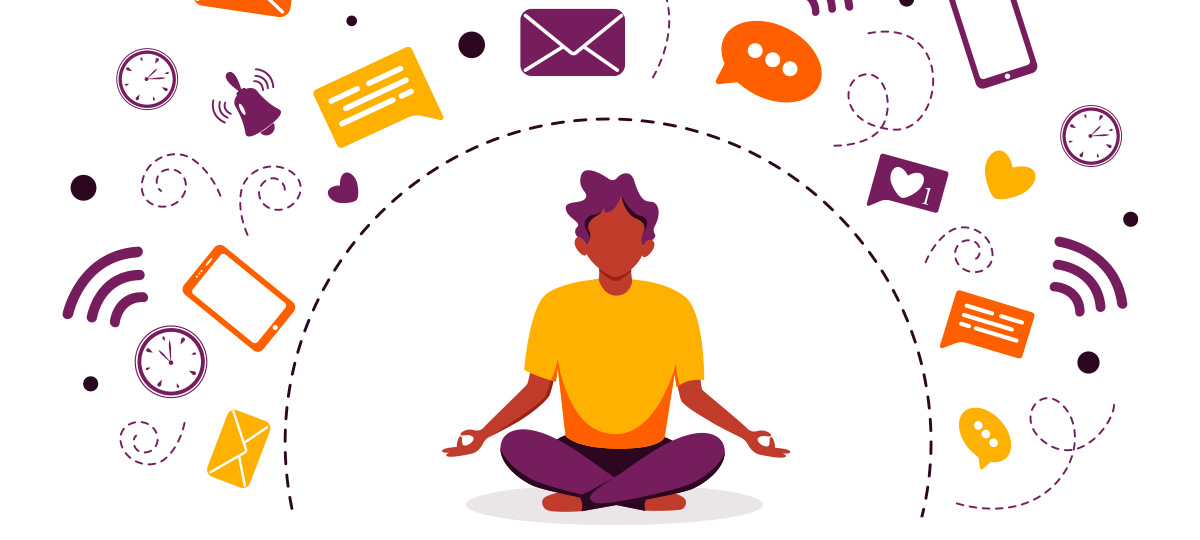Why a Digital Detox is Good for Your Physical and Mental Health
There’s plenty to love about the handheld computers we carry around in our pockets, like being able to capture photos immediately and in the moment, getting directions that will (mostly) get us where we’re going, and allowing us to stay better connected to the people we love who don’t live close to us.
But with digital devices that do it all comes some very real risks—especially if we start spending too much time in front of a screen.
If you’re feeling a little too much pull toward your devices, consider if adding regular digital detoxes to your self-care regimen can keep you both happier and healthier.
Following are a few key benefits of digital detoxes:
Improved sleep. According to the Sleep Foundation, the blue light emitted by screens can interfere with the production of melatonin, the sleep-inducing hormone. A digital detox—especially one that includes a relaxing bedtime routine and an embargo on screens in the bedroom—can help improve sleep quality by allowing your body to naturally wind down.
Reduced stress and anxiety. Constant exposure to digital devices, notifications and information overload can contribute to increased stress and anxiety. A digital detox allows you to step away from the demands of technology, providing a mental break and reducing feelings of overwhelm.
More focus on your emotional well-being. Stepping back from the digital world allows you to tune into your own emotions and needs. This self-reflection can lead to better emotional regulation and an increased sense of overall well-being.
Get better perspective on yourself. Social media platforms can contribute to feelings of inadequacy through constant comparison. A digital detox provides a reprieve from the pressure to measure up to others, promoting a healthier self-image and self-esteem.
Be more present. Digital detoxes encourage you to be more present in the moment and connect with the real world. This can strengthen relationships, improve communication and create meaningful experiences without the distraction of screens.
Digital Detox 101: 7 Tips to Help You Unplug
- Set clear goals. Getting the most out of taking a break from technology requires that you spend time thinking about why you need the pause and what you hope to gain by relying less on your digital devices. Think about specific goals you have for your digital detox. Whether it’s reducing screen time, limiting social media use or taking a break from work emails, having clear objectives will help you stay focused.
- Choose a time frame. Decide on the duration of your digital detox. It could be a day, a weekend, or even a week, depending on your comfort level and commitments.
Bonus Tip! If you’re worried you won’t be able to completely unplug, you’re not alone. If going completely offline feels challenging, start by gradually reducing your screen time. Set specific periods each day when you’ll be completely unplugged. You can also designate specific areas in your home where electronic devices are not allowed, like your bedroom, dining area or any other space that allows you to unwind without screens.
- Get others on board. Let friends, family, and colleagues know about your digital detox plan in advance so they’ll be aware of your reduced availability and can respect your boundaries during this time.
- Turn off notifications. Disable non-essential notifications on your devices to minimize the urge to check them constantly. This can help create a more peaceful environment during your detox.
- Create a plan. Plan activities to fill the time you would typically spend on digital devices. Consider outdoor activities, hobbies, or spending quality time with friends and family.
Bonus Tip! Rediscover analog activities such as reading physical books, writing in a journal, drawing or playing board games. These activities can be refreshing and fulfilling.
- Back to basics. When doing a digital detox, consider using a basic phone that only allows for calls and texts so you’re still able to stay connected in emergencies while simultaneously limiting distractions.
- Evaluate and reflect. Use this time to reflect on your digital habits. Consider what aspects of your online life contribute positively to your well-being and what may be causing stress. Use this insight to make sustainable changes moving forward.
Bonus Tip! After your digital detox is over maintain healthy online habits by establishing clear boundaries for device use. Implement new habits that align with your goals, such as setting specific times for checking emails or social media.
Get Physical: Try Your Hand (and Arms, Legs and Core) at Kayaking
Living by the water offers myriad benefits, from the calming effects of sitting on the shoreline to the opportunity to get cool quick on those (upcoming) Summer days.
But if you live by the water, you might also consider finding a new hobby that can give you fitness results without overstressing your physical body: kayaking.
Some of the physical benefits of kayaking include:
- Increased upper-body strength. Massage therapist rely on their arms to perform massage, and kayaking can be a great way to increase strength and muscle tone, not only in the arms, but also the surrounding muscles in the shoulders, chest and back.
- Leg strength. You might not think you’re gaining any lower body strength when participating in activities that don’t require much leg use. But kayaking requires leg strength, too, especially for balance and when changing directions.
- Core strength. Similar to leg strength, kayaking works your core because core strength is necessary for centering yourself and balancing on the water. Even when not paddling, your core will get a mini-workout keeping you upright.
- Added endurance. Endurance is integral to a massage therapist’s career longevity, and kayaking can be a great hobby to help you increase your endurance. Paddling longer and longer routes as you become more adept at the sport may build endurance and increase energy.
